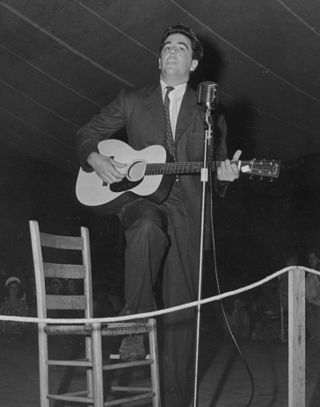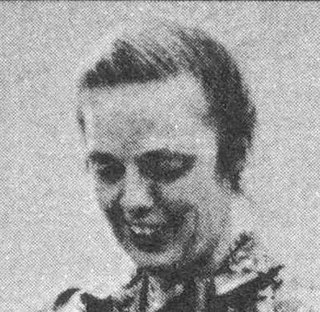Related Research Articles

Blind Willie McTell was a Piedmont blues and ragtime singer and guitarist. He played with a fluid, syncopated fingerstyle guitar technique, common among many exponents of Piedmont blues. Unlike his contemporaries, he came to use twelve-string guitars exclusively. McTell was also an adept slide guitarist, unusual among ragtime bluesmen. His vocal style, a smooth and often laid-back tenor, differed greatly from many of the harsher voices of Delta bluesmen such as Charley Patton. McTell performed in various musical styles, including blues, ragtime, religious music and hokum.

Alan Lomax was an American ethnomusicologist, best known for his numerous field recordings of folk music of the 20th century. He was a musician himself, as well as a folklorist, archivist, writer, scholar, political activist, oral historian, and film-maker. Lomax produced recordings, concerts, and radio shows in the US and in England, which played an important role in preserving folk music traditions in both countries, and helped start both the American and British folk revivals of the 1940s, 1950s, and early 1960s. He collected material first with his father, folklorist and collector John Lomax, and later alone and with others, Lomax recorded thousands of songs and interviews for the Archive of American Folk Song, of which he was the director, at the Library of Congress on aluminum and acetate discs.

John Avery Lomax was an American teacher, a pioneering musicologist, and a folklorist who did much for the preservation of American folk music. He was the father of Alan Lomax, John Lomax Jr. and Bess Lomax Hawes, also distinguished collectors of folk music.
"Long Black Veil" is a 1959 country ballad, written by Danny Dill and Marijohn Wilkin and originally recorded by Lefty Frizzell.
The Archive of Folk Culture was established in 1928 as the first national collection of American folk music in the United States of America. It was initially part of the Music Division of the Library of Congress and now resides in the American Folklife Center.

Richard K. "Dick" Spottswood is an American musicologist and author from Maryland, United States who has catalogued and been responsible for the reissue of many thousands of recordings of vernacular music in the United States.
"See See Rider", also known as "C.C. Rider", "See See Rider Blues" or "Easy Rider", is a popular American 12-bar blues song that became a standard in several genres. Gertrude "Ma" Rainey was the first to record it on October 16, 1924, at Paramount Records in New York. The song uses mostly traditional blues lyrics to tell the story of an unfaithful lover, commonly called an "easy rider": "See see rider, see what you have done", making a play on the word "see" and the sound of "easy".
"Take This Hammer" is a prison, logging, and railroad work song, which has the same Roud number as another song, "Nine Pound Hammer", with which it shares verses. "Swannanoa Tunnel" and "Asheville Junction" are similar. Together, this group of songs are referred to as "hammer songs" or "roll songs". Numerous bluegrass bands and singers like Scott McGill and Mississippi John Hurt also recorded commercial versions of this song, nearly all of them containing verses about the legendary railroad worker, John Henry; and even when they do not, writes folklorist Kip Lornell, "one feels his strong and valorous presence in the song".

Bess Lomax Hawes was an American folk musician, folklorist, and researcher. She was the daughter of John Avery Lomax and Bess Bauman-Brown Lomax, and the sister of Alan Lomax and John Lomax Jr.
"I'm Alabama Bound" is a ragtime melody composed by Robert Hoffman in 1909. Hoffman dedicated it to an M. T. Scarlata. The cover of its first edition, published by Robert Ebberman, New Orleans, 1909, advertises the music as "Also Known As The Alabama Blues" which has led some to suspect it of being one of the first blues songs. However, as written, it is an up-tempo rag with no associated lyrics. The song has been recorded numerous times in different styles—both written and in sound recordings—with a number of different sets of lyrics.
"Walkin' Blues" or "Walking Blues" is a blues standard written and recorded by American Delta blues musician Son House in 1930. Although unissued at the time, it was part of House's repertoire and other musicians, including Robert Johnson and Muddy Waters, adapted the song and recorded their own versions.

Looking for a Home is an album by American folk singer Odetta, released in 2001. It consists of songs written and/or performed by Huddie Ledbetter, better known as Leadbelly.

"O Death", also known as "O, Death", "Oh Death" and "Conversations with Death", is a traditional Appalachian folk song, listed as number 4933 in the Roud Folk Song Index. The song is generally attributed to the musician and Baptist preacher Lloyd Chandler, but it was likely taken or adapted from folk songs already existing in the region.

The Union Boys was an American folk music group, formed impromptu in 1944, to record several songs on an album called Songs for Victory: Music for Political Action. Its "all-star leftist" members were Josh White, Sonny Terry, Brownie McGhee, Pete Seeger, Burl Ives, Tom Glazer.
"Cumberland Gap" is an Appalachian folk song that likely dates to the latter half of the 19th century and was first recorded in 1924. The song is typically played on banjo or fiddle, and well-known versions of the song include instrumental versions as well as versions with lyrics. A version of the song appeared in the 1934 book, American Ballads and Folk Songs, by folk song collector John Lomax. Woody Guthrie recorded a version of the song at his Folkways sessions in the mid-1940s, and the song saw a resurgence in popularity with the rise of bluegrass and the American folk music revival in the 1950s. In 1957, the British musician Lonnie Donegan had a No. 1 UK hit with a skiffle version of "Cumberland Gap".
"Good Shepherd" is a traditional song, best known as recorded by Jefferson Airplane on their 1969 album Volunteers. It was arranged and sung by the group's lead guitarist Jorma Kaukonen, who described their interpretation of it as psychedelic folk-rock.

James "Iron Head" Baker and Moses "Clear Rock" Platt were African American traditional folk singers imprisoned in the Central State Prison Farm in Sugar Land, Texas. The men made a number of field recordings of convict work songs, field hollers and other material with John Lomax for the Library of Congress Archive of American Folk Music in the 1930s.

Sid Hemphill was an American blues multi-instrumentalist and bandleader who played in his own string band mainly in Mississippi. He recorded for Alan Lomax in 1942 and again in 1959.
Arthur Spark Rosenbaum was an American art professor at the University of Georgia, an artist, musician, and folklorist. He won a Grammy award in 2008 for Best Historical Album, for his music collection Art Of Field Recording Volume I: Fifty Years Of Traditional American Music Documented By Art Rosenbaum.
The Southern Journey is the popular name given to a field-recording trip around the Southern States of the USA by the renowned ethnomusicologist Alan Lomax. He was accompanied on the trip by his then-lover, English folk singer Shirley Collins. It resulted in the first stereo field-recordings in the Southern United States, and is perhaps most noted for the 'discovery' of 'Mississippi' Fred McDowell. The music collected on the trip has had inestimable impact on the development of popular music. Tracks recorded on the trip were sampled by Moby for his Platinum-selling album Play. It also served as the inspiration for the soundtrack to the Coen Brothers' film O Brother Where Art Thou. The Southern Journey is the subject of a fascinating autobiography by Shirley Collins entitled 'America over the Water'. It is also the subject of s 2017 feature documentary, The Ballad of Shirley Collins. Lomax' own recollections of the trip were documented in his autobiography "The Land Where Blues Began", which won the National Book Award for Nonfiction in 1993.
References
- ↑ "Sidney Stripling- Discography on Discogs". Discogs .
- ↑ Notes for Deep river of Song: Georgia (Rounder Records 2001); David Evans, Ph.D.
- ↑ "A List of Banjo Recordings in the Archive of Folk Culture (The American Folklife Center, Library of Congress)". Library of Congress .